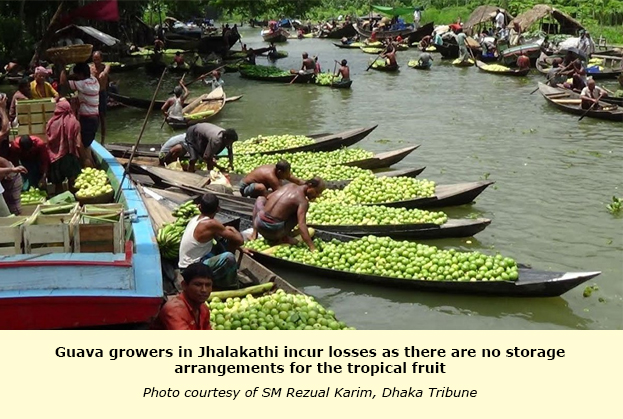Guava growers in Jhalakathi are incurring losses because there are no storage arrangements for the tropical fruit.

This fruit perishes within a few days of ripening—and can no-longer be sold.
Guava is eaten raw and is rich in vitamin C and other nutrients. It is most popularly known as Bengal’s apple. The fruit can be also used to make jam, jelly, and juice.
According to stakeholders, farmers and traders would be able to make a large profit if a cold storage or jam factory were established in the guava-rich district of Barisal. The district administration and Department of Agriculture Extension said a feasibility study is being conducted to build a cold storage facility in a village of sadar upazila.
There are many guava orchards in Barisal’s Banaripara, Pirojpur’s Swarupkathi, and Jhalakathi sadar upazila. The fruit has been produced in the region for about 300 years. Most of the guava orchards are located in Jhalakathi sadar upazila and the government has recognized guava as the prime commodity of the district. Guava is produced on 1,236 acres of land across 20 villages of Kirtipasha union of the district’s sadar upazila.
There are 15-20 floating guava markets in orchard areas. Of these markets, Bhimruli market, under Jhalakathi sadar upazila, is the largest. This floating market has now become a tourist spot. Thousands of local and foreign tourists visit Bhimruli market to enjoy the scenery. But no infrastructure has developed there for the tourists.
Jhalakathi Deputy Commissioner Md Hamidul Haque said they have already received funds from the Ministry of Civil Aviation and Tourism and work will soon begin to construct rest houses and other facilities for tourists. He said they have also taken initiatives to store the fruit. “We are also working to find private entrepreneurs to build a guava jam factory,” the deputy commissioner added.
Source: SM Rezual Karim, Dhaka Tribune
